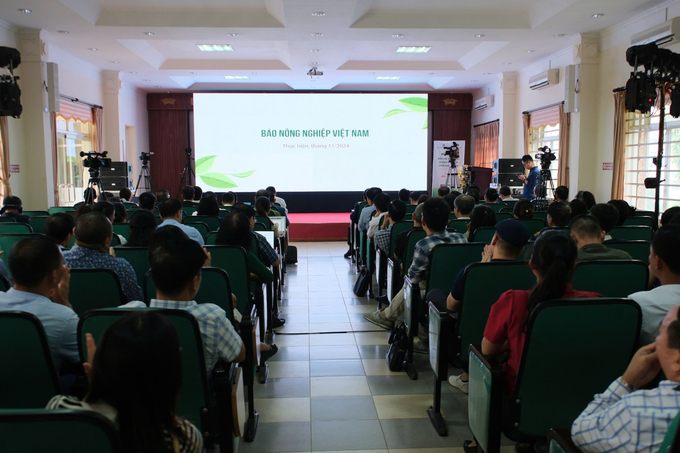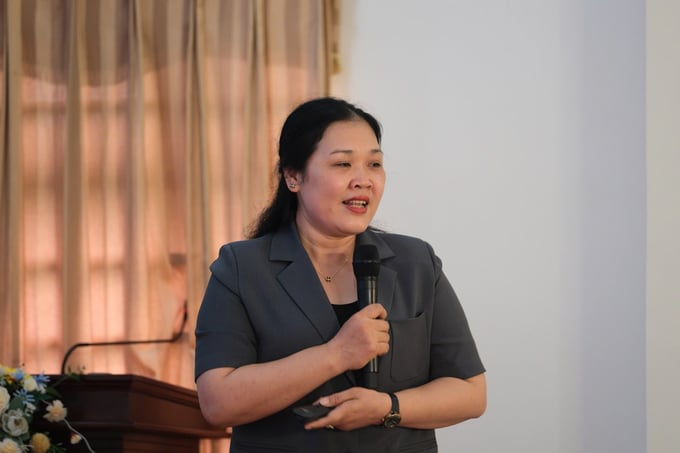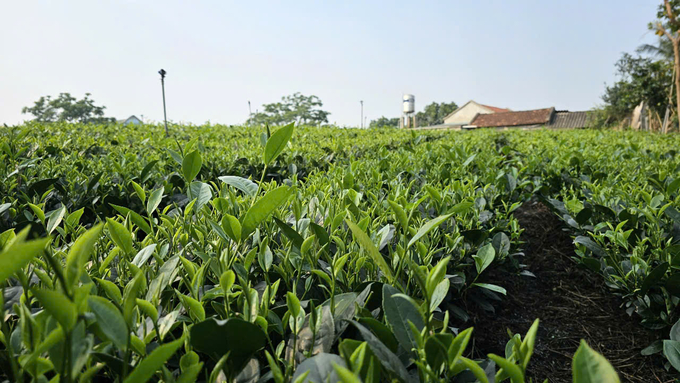May 17, 2025 | 13:02 GMT +7
May 17, 2025 | 13:02 GMT +7
Hotline: 0913.378.918
May 17, 2025 | 13:02 GMT +7
Hotline: 0913.378.918

On November 5th, the "Connecting production and consumption of high-quality tea" forum was held in Phu Tho, one of the key tea-producing regions of the country. Photo: Quynh Chi.
On November 5th, the Plant Cultivation Department, Vietnam Agriculture Newspaper, the Northern Mountainous Forestry and Agricultural Science Institute, in cooperation with the Vietnam Gardeners' Association, organized the forum "Connecting production and consumption of high-quality tea" in Phu Tho.
Tea has been established as a key economic crop in several provinces such as Thai Nguyen, Ha Giang, Phu Tho, Lai Chau, Nghe An, Ha Tinh, and is included in the Ministry of Agriculture and Rural Development's plan to develop six major industrial crops during the 2021-2030 period.
In addition to the traditional tea varieties, there are now 32 new tea varieties with higher quality and productivity, suitable for different production regions, creating a variety of high-quality products. Technical solutions for tea cultivation have been improved, with many areas adopting mechanization in land preparation, fertilization, pruning, pest and disease control, irrigation, etc. Tea cultivation according to VIETGAP standards and organic practices is increasingly popular and being applied in many provinces.
The Northern Mountainous Forestry and Agricultural Science Institute was established with the aim of conducting scientific research and transferring technology in forestry and agriculture to support the development of the midland and northern mountainous regions. Specifically, for tea cultivation, the institute is tasked with nationwide implementation. Tea science and technology have made significant achievements in the development of new tea varieties, as well as technical advancements and cultivation processes, all of which play a key role in stabilizing the 120.000 ha of tea plantations, with an average yield of 9.5 tons/ha.
From 2019 to 2023, research on tea cultivation was carried out through 30 tasks, with a total funding of 2.3 million USD (including 7 tasks at the ministry level and 4 tasks at the state level). Based on these tasks, the Northern Mountainous Forestry and Agricultural Science Institute has selected a new set of 16 tea varieties. In addition, the institute has developed sustainable cultivation processes, including 5 technical advancements at the ministry level and 13 technical procedures at the local level, which have been applied to thousands of hectares of safe tea plantations meeting VietGAP standards and organic tea standards, thereby contributing to increasing the value of Vietnamese tea products.

According to Dr. Nguyen Thi Hong Lam, new tea varieties such as Huong Bac Son, TRI5.0, PH12, PH14, LP18, TC4, LCT1, PH22, PH276, VN15, PH21... are evaluated to have strong growth, high yield, and good quality. Photo: Quynh Chi.
At the "Connecting production and consumption of high-quality tea" forum, Dr. Nguyen Thi Hong Lam, Deputy Director of the Tea Research and Development Center (Northern Mountainous Forestry and Agricultural Science Institute), stated that the Institute has made significant progress in research, improvement, and recognition of new tea varieties to meet the growing demands of production.
Specifically, the Institute has successfully developed and recognized two new tea varieties: Huong Bac Son and TRI5.0. In particular, following the requirements of the 2019 Crop Planting Law, the Institute has submitted dossiers for 11 tea varieties, which were accepted and officially recognized by the Plant Cultivation Department for circulation. These include notable varieties such as VN15, LCT1, PH21, TC4, PH12, PH14, LP18, PH22, PH276, CNS141, CNS183, and Bat Tien.
Additionally, to meet production needs, the Institute has used savings from its funding to prepare dossiers and submit them to the Plant Cultivation Department for the re-recognition and self-declaration of two other tea varieties, LDP1 and PH1.
According to Dr. Nguyen Thi Hong Lam, new tea varieties such as Huong Bac Son, TRI5.0, PH12, PH14, LP18, TC4, LCT1, PH22, PH276, VN15, PH21... are all evaluated as strong-growing varieties with high yields and good quality, playing an important role in diversifying the variety structure as well as tea products in Vietnam.
Currently, there are three groups of new tea varieties being researched, which align with the product orientation for tea production: The group for processing premium tea products such as Oolong, fragrant green tea, Mao Tiem, and Bich Loa Xuan; the group for processing high-quality green tea; the group for processing black tea, white tea, Pu-erh and red tea.
"To further develop high-quality tea germplasm, the Institute has been actively maintaining and collecting materials both domestically and internationally. At present, the Institute is preserving a collection of 406 tea germplasm sources, while also managing 17 elite tea gardens with a total area of 31.3 hectares. In addition, the Institute is responsible for managing and conserving 142 Shan tea trees in Yen Cu Commune, Cho Moi District, Bac Kan, as well as many other elite tea trees located in various regions such as Thanh Ba in Phu Tho Province.
Furthermore, in compliance with the Intellectual Property Law, the Institute has successfully secured the protection of intellectual property rights for three newly developed tea varieties: Huong Bac Son, LCT1, and TRI5.0. These varieties have been granted official protection as new plant varieties, marking an important milestone in establishing clear product traceability and developing a recognizable brand for these varieties. This step lays a strong foundation for the sustainable development of the Vietnamese tea industry, helping to ensure both quality and origin transparency for tea products moving forward", said Dr. Nguyen Thi Hong Lam.

The Northern Mountainous Forestry and Agricultural Science Institute has selected a set of 16 new tea varieties along with sustainable cultivation techniques. Photo: Quynh Chi.
The current tea cultivation processes have significantly transformed the farming practices of both local farmers and tea-producing enterprises, leading to the production of fresh tea buds that meet safety standards. This shift has not only improved the quality of the raw material but also contributed to increasing the overall value of tea products.
Looking ahead, the Northern Mountainous Forestry and Agricultural Science Institute has outlined its focus on developing new tea varieties that are not only high-yielding and of superior quality but also capable of withstanding drought conditions, which is becoming increasingly important due to the severe impacts of climate change. In addition to improving yield and quality, the Institute is prioritizing the development of tea varieties with high polyphenol content. These varieties will serve the growing demand for high-quality teas as well as functional food products, which are gaining popularity due to their health benefits. Moreover, the Institute is exploring the application of molecular biotechnology and biochemistry to enhance the resistance of tea plants to pests and diseases.
In the field of tea cultivation research, the Institute has placed significant emphasis on developing integrated nutrient management strategies for tea plants. This includes the careful selection of organic materials, minerals, soil conditioners, and appropriate shading plants to ensure the stability and sustainability of soil fertility. These efforts are particularly focused on supporting the growth of organic tea farming in the northern mountainous regions of Vietnam. By establishing effective and sustainable organic tea production methods, the Institute aims to meet both local and global demand for environmentally-friendly tea products.
Furthermore, the Institute is conducting research on the restoration of degraded tea plantations and the replanting of tea in long-established tea-growing areas. This research aims to improve both the long-term yield and the quality of tea, ensuring that these plantations remain productive for many years to come. Additionally, the application of high-tech (4.0 technology) in tea production is being explored to enhance the adaptability of tea plants to climate change, ensuring the resilience of tea farming in the face of increasingly unpredictable environmental conditions.
Translated by Phuong Linh

(VAN) The 'For a Green National Environment' programme aims to promote a green lifestyle, support businesses in implementing ESG practices, and turn Net Zero commitments into concrete actions.

(VAN) Cold-barn systems efficiently manage environmental and temperature conditions, which aids in the prevention of respiratory diseases in pigs and protects them from the vectors that transmit African swine fevers.

(VAN) To tackle challenges, the project 'Addressing key technical bottlenecks in the grouper supply chain in Vietnam' has been underway since 2024.

(VAN) The project 'Disease-Resilient and Sustainable Cassava Production Systems in the Mekong Region', funded by the Australian Center for International Agricultural Research (ACIAR), is being implemented from 2024 to 2028.

(VAN) Data from 10,000 farming households will help professionalize production organization and support the implementation of the One Million Hectares Program for High-Quality, Low-Emission Rice Cultivation.

(VAN) FAO Director-General QU Dongyu marks International Day of Plant Health at NENA conference.

(VAN) Deputy Minister of Agriculture and Environment Hoang Trung affirmed that floriculture and ornamental plants are a growing industry that receives significant global attention.